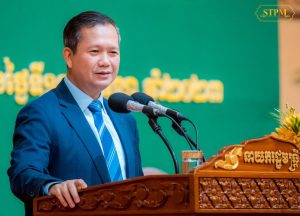Cambodian Prime Minister Hun Manet capped his first 100 days in office with a highly successful Water Festival, which marked the return of dragon boat racing for the first time since 2019 and – as many said privately – hopefully better days ahead.
The importance of the boat races should not be underestimated after their recent cancellations due to drought, the COVID-19 pandemic, and security concerns amid last year’s ASEAN summits and the Southeast Asian Games.
In 2019, the festival was shrouded with concerns after opposition leader in exile Sam Rainsy made a failed bid to return on November 9 and oust then prime minister, Hun Manet’s father, Hun Sen. And officials were also mindful after a bridge stampede during the Water Festival in 2010 that left 347 people dead.
A successful Water Festival also marked a somewhat return to normality after a seven-year crackdown on dissent, this year’s election, and a generational transfer of power in which Hun Manet succeeded his father as prime minister and cabinet ministers handed their portfolios to their offspring or close relatives.
That’s where next year begins. Diplomatic and business sources are expecting a major bureaucratic shake-up, timed around the February 25 Senate elections, with a focus on oknha, a title meaning “lord” that is bestowed on civilians and business leaders for rendering services to the government.
There are about a thousand oknhas and not all are held in high esteem. Some have been tied to human trafficking and scam compounds, others to corruption of various sorts. Cambodia’s chief foreign benefactor, China, is particularly annoyed and wants an end to trafficking and the problem oknhas weeded out.
A report published in September last year by the Global Initiative Against Transnational Crime, entitled “Sihanoukville a Hub of Environmental Crime Convergence,” highlighted China’s anger with a certain brand of oknhas who have obstructed efforts to stamp out organized crime.
Additionally, the report adds that there is a widespread belief of a “Chinese state-backed development that disregards any associated criminal activity” and notes that Beijing “views criminal activity by Chinese-associated gangs and groups in Sihanoukville as detrimental to its reputation.”
The report names those oknhas and their Cambodian business partners who “could present a future headache for Hun Manet” and singles them out “as pertinent to understanding environmental crime in Sihanoukville, noting too that there are a number of Chinese-born, naturalized Cambodian citizens who are designated oknhas.”
Cambodia wants and needs legitimate Chinese investors and tourists to return but Beijing is reluctant and has instead approved locally made movies like “No More Bets” that detail the plight of Chinese lured and sold into compounds where they are forced to work online scams.
That film is often cited for frightening off Chinese tourists in Cambodia and in Myanmar, where the junta had ignored Beijing’s requests to hand over Chinese suspected of operating those syndicates.
China’s response has been to back warring factions opposed to the military. Significant gains were made through Operation 1027– a potential game changer for the opposition National Unity Government – but the point remains its gains were spawned at least partly out of Beijing’s irritation with the junta.
The junta had no choice but to respond.
Xinhua reported on November 21, that 31,000 suspects including 63 alleged masterminds, organizers, or key members, as well as 1,531 fugitives were transferred from Myanmar to Chinese custody in a crackdown on telecom fraud originating from northern Myanmar.
That number is a healthy reflection of the scale of a regional issue that emanated out of Sihanoukville on Cambodia’s southern coast during the COVID-19 pandemic, when organized crime syndicates and boiler room operators began focusing on out-of-work youth in need of employment.
China remains upset on several fronts: its citizens have been targeted, and its government has faced erroneous allegations that it somehow is “in league” with the criminal syndicates. Money laundering associated with online scams is also a drain on its economy when it can least afford it.
It’s a recipe that has the smart people within Cambodia’s new government line-up on notice and this will come into play early in the new year, whether old school sycophants, among others, who would prefer to wish such problems away, like it or not.

































